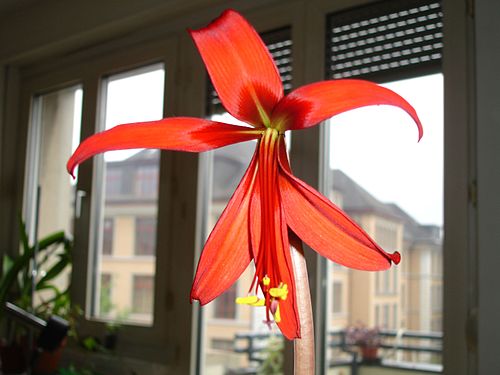Sprekelia
| Habit | bulbous
| |
|---|---|---|
| Lifespan: | ⌛ | perennial |
| Origin: | ✈ | C America |
| Bloom: | ❀ | late spring, early summer |
| Exposure: | ☼ | sun, part-sun |
|---|---|---|
| Water: | ◍ | moderate |
| USDA Zones: | 8.5 to 11 | |
| Flower features: | ❀ | red |
If this plant info box on watering; zones; height; etc. is mostly empty you can click on the edit tab and fill in the blanks!
Sprekelia is a genus of at least three bulbous plants in the family Amaryllidaceae, or Alliaceae.[1] They are native to Central America. Like Hippeastrum, these plants were known as Amaryllis. Sprekelia plants are sometimes called "Aztec lilies", although they are not true lilies.
S. formosissima is common in cultivation, planted in warm climates or raised in pots in colder climates, or planted and lifted, much as the gladiolus. Even when well grown, bulbs often do not bloom every year. In a grouping of about a dozen bulbs, only two or three may bloom in any given year.
Read about Sprekelia in the Standard Cyclopedia of Horticulture
|
|---|
|
Sprekelia (J. H. von Sprekelsen, of Hamburg, who sent the plants to Linnaeus). Amaryllidaceae. Jacobaean Lily. Half-hardy bulbous plants, generally grown in the greenhouse, often known as amaryllis: lvs. appearing late, strap-shaped-linear: scape hollow, cylindrical, l-fld.: fl. large, showy; perianth gaping, tube none, upper segm. broadest, 2 lateral lanceolate, 3 lowest deflexed, rolled together inclosing the stamens and style; ovary turbinate, 6-angled, 3-celled: caps. globose-trigonous, 3-valved.—One species, Mex. For cult., see Amaryllis; also consult Hippeastrum, with which these plants are sometimes confused.
|
Cultivation
Propagation
Pests and diseases
Species
- Sprekelia clintiae, Traub, 1965 Pl. Life 21: 64
- Sprekelia cybister, Herb., 1840 Edwards’s Bot. Reg. 1840:t. 33
- Sprekelia formosissima, L. Herb., 1821 Appendix 35
- Sprekelia glauca, Lindl., 1840 Edwards’s Bot. Reg. 26: Misc. 65
- Sprekelia howardii, Lehmiller
- Sprekelia karwinskii, Zucc. Roem., 1847 Fam. Nat. Syn. Monogr. 4: 144
- Sprekelia ringens, C.Morren, 1846 Ann. Soc. Roy. Agric. Gand 2: 133, t. 60
Gallery
References
- ↑ APG zitiert Kew Garden
External links
- w:Sprekelia. Some of the material on this page may be from Wikipedia, under the Creative Commons license.
- Sprekelia QR Code (Size 50, 100, 200, 500)




